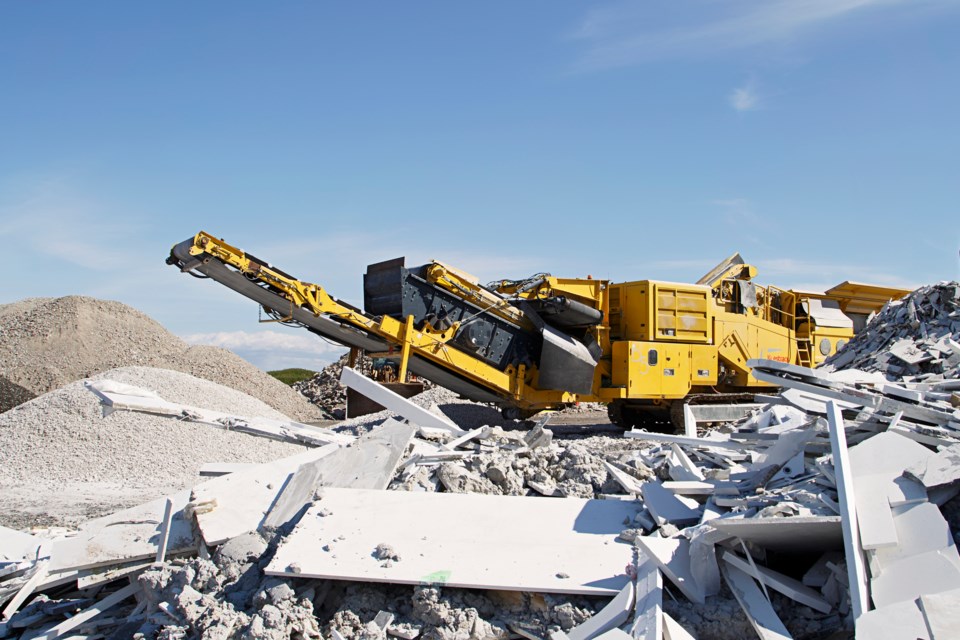Metro Vancouver’s population is projected to swell from today’s 2.6 million to 3.8 million by 2050.
At the same time as construction and demolition activities are ramping up, the metropolis is looking to reach ambitious waste reduction targets. Ecowaste Industries Ltd. (Ecowaste) plans to be part of the solution.
The privately-held, Canadian-owned company received a 2020 Environmental Excellence award from the Waste Management Association of B.C. for its investments in its recycling program. It is now stepping up efforts to address the “challenges of diverting waste from the landfill as well as reducing the need for transportation in the region,” says Christian Dietrich, Ecowaste’s general manager. “This inspired us to come up with a local option.”
Ecowaste has been operating a landfill since 1971. From taking mostly soil during the early years, the company now receives roughly half of their business from waste generated from the construction or demolition of buildings, such as wood, concrete, plastics, roofing materials and insulation.
The changes in intake – along with growing awareness about sustainability – inspired Ecowaste to invest in recycling equipment. Resulting activities now include conversion of yard waste into compost, clean wood into biomass, and concrete into aggregate.
“One of our machines breaks down pieces of concrete into two inch and smaller pieces that can be reused in construction or roadbuilding,” Dietrich says. “We also have a wood-grinding operation, which turns used discarded lumber into wood chips that we sell to businesses across the Lower Mainland for energy.”
These measures allow Ecowaste to keep about one-third of its intake out of the landfill, but the goal is to get this number up to 70 or 80 percent, he says. “We plan to build a large materials recovery facility, or MRF, where inbound materials pass through different equipment that separates them based on their density, size and composition.”
The proposed 100,000-square-foot, multi-million dollar facility will allow the separation of wood, concrete, metal, plastic and more, which can then be recycled or reused. Dietrich sees this as “key for reducing the environmental impact of the construction industry.”
However, these plans are currently on hold due to pending regulatory approvals: Ecowaste is seeking to extend the life of the landfill, which now operates on a permit that ends in 2035 as well as increase its height allowance.
“Our license allows us a certain waste height within the landfill, and we currently only have space for about three years of current volumes,” he explains. “Even if the MRF would allow us to recycle most of the material, there will still be some materials that will not be able to be recycled or reused which we will have to landfill throughout the expected life of the MRF, some 30 years.”
And should the permit run out, all buildings and structures would have to be removed from the property by 2035, “which makes the business case for a multi-million facility challenging,” he adds.
Metro Vancouver has the aspiration of diverting 80 percent of solid waste from landfills, but the number currently hovers at 63 percent.
While every effort, including banning plastic straws, is a step in the right direction, the proposed MRF would enable a big leap forward, believes Dietrich. “We have a robust solution. It doesn’t require taxpayers’ money and there is no opposition from our neighbours.”
The benefits of having a “local recycling and landfill facility – and a company that is committed to investing in recycling technologies should be obvious,” he notes. “Having an outlet for receiving construction and demolition materials and dealing with them responsibly would give businesses, including construction and hauling companies, confidence about the future.”
And a timely removal of the regulatory obstacles would allow Ecowaste to invest and “help to raise the region’s diversion rate to nearly 70 per cent with the addition of this new facility,” says Dietrich. “The clock is ticking. We have to look beyond today’s numbers and think about the next few decades.”
Ecowaste is featured in the 2021 Environmental Excellence in B.C. magazine.



